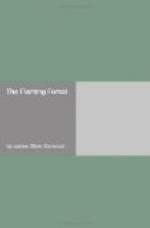It was their wrangling that roused Carrigan to the fact that he was not dead. It was a thrilling discovery—that and the fact that he made out clearly a patch of sunlight in the sand. He did not move, but opened his eyes wider. He could see the timber. On a straight line with his vision was the thick clump of balsam. And as he looked, the boughs parted and a figure came out. Carrigan drew a deep breath. He found that it did not hurt him. He gripped the fingers of the hand that was under his body, and they closed on the butt of his service automatic. He would win yet, if God gave him life a few minutes longer.
His enemy advanced. As he drew nearer, Carrigan closed his eyes more and more. They must be shut, and he must appear as if dead, when the other came up. Then, when the scoundrel put down his gun, as he naturally would—his chance would be at hand. If a quiver of his eyes betrayed him—
He closed them tight. Dizziness began to creep over him, and the fire in his brain grew hot again. He heard footsteps, and they stopped in the sand close beside him. Then he heard a human voice. It did not speak in words, but gave utterance to a strange and unnatural cry. With a mighty effort Carrigan assembled his last strength. It seemed to him that he brought himself up quickly, but his movement was slow, painful—the effort of a man who might be dying. The automatic hung limply in his hand, its muzzle pointing to the sand. He looked up, trying to swing into action that mighty weight of his weapon. And then from his own lips, even in his utter physical impotence, fell a cry of wonder and amazement.
His enemy stood there in the sunlight, staring down at him with big, dark eyes that were filled with horror. They were not the eyes of a man. David Carrigan, in this most astounding moment of his life, found himself looking up into the face of a woman.
III
For a matter of twenty seconds—even longer it seemed to Carrigan —the life of these two was expressed in a vivid and unforgettable tableau. One half of it David saw—the blue sky, the dazzling sun, the girl in between. The pistol dropped from his limp hand, and the weight of his body tottered on the crook of his under-elbow. Mentally and physically he was on the point of collapse, and yet in those few moments every detail of the picture was painted with a brush of fire in his brain. The girl was bareheaded. Her face was as white as any face he had ever seen, living or dead; her eyes were like pools that had caught the reflection of fire; he saw the sheen of her hair, the poise of her slender body—its shock, stupefaction, horror. He sensed these things even as his brain wobbled dizzily, and the larger part of the picture began to fade out of his vision. But her face remained to the last. It grew clearer, like a cameo framed in an iris—a beautiful, staring, horrified face with shimmering tresses of jet-black hair blowing about it like a veil. He noticed the hair, that was partly undone as if she had been in a struggle of some sort, or had been running fast against the breeze that came up the river.




